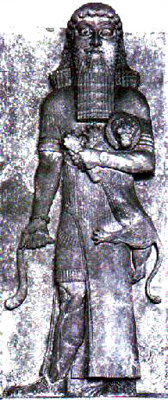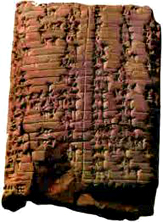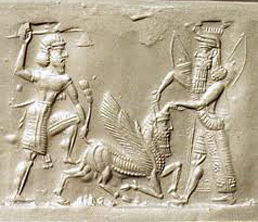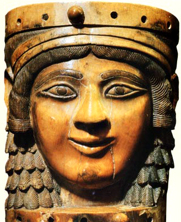Projects
Concerts for Abed Azriť
The Epic of Gilgamesh
According to the Sumerian-Babylonian tablets (2000 BC)
A bilingual audiovisual concert for a western and oriental ensemble and chorus

Libretto, music and singing: Abed Azriť
Vocal ensemble and two reciters (German):
4 female voices, 4 male voices, 2 actors
Baritone vocal solo (Arabic)
With traditional and contemporary orchestration
Instruments: viola, cello, double bass, oud, kanoun, nai
The Epic of Gilgamesh is the most famous creation in ancient Mesopotamia. It did not originate in a specific environment, at a certain age or within a single nation, but arose from the Sumerian mythology and has spread over Babylon and Assyria, and has found its way to the Middle East within more than a millennium.
The Gilgamesh epic is primarily the story of a friendship that arises first from a rivalry, strengthens in danger, deepens in common heroic deeds, and finally dissolves painfully in death. It is also the topic of exorbitance of the heroic figures who, hasting from victory to victory, do not know how to control themselves, and thus offend the gods. This sacrilegious arrogance results in punishment and death: in the heart of the survivors, the fear of death turns into an unbearable anguish of the human being, who is suddenly aware of the uncertainty of life. His desperate search for the secret of immortality is in vain: all attempts to find immortality throw him even deeper into despair until the day on which he is returning from a long odyssey, eventually finding peace and wisdom.



tablet fragments of the Epic of Gilgamesh, portrayal of Gilgamesh and Enkidu, portrayal of Ishtar
In ancient Mesopotamia, the archetype of the hero-savior, which has survived the ages, was created. As a universal archetype, it lives on in the Greco-Roman civilization (Hercules, Achilles, Ulysses, Alexander the Great), in the three monotheistic religions, then it spreads out over the European Middle Ages to the present time and thus becomes part of human history. This Mesopotamian myth, which was written down about 5000 years ago, reveals to us still today an important part of our civilization. It is a distant testimonial of our humankind, by which is moving and occupying us still today. Its themes have preserved their "modernity" and generate an internal resonance even in the man of today.
The epic about the heroic deeds of Gilgamesh, which originated in the cradle of civilization, has survived the ages. With its themes of human existence and the search for consciousness and the creative potential of the human being, it still speaks to us today. For millennia it was adapted by all nations, which have penetrated into the empires of Babylon and Assyria, and and could spread up to the facades of Western churches through the exchange between the Orient and Europe at the beginning of the Middle Ages.
What is known as Song of Roland and Chansons de Gestes in the old French epic of the Middle Ages or as Odyssee in Greece, had its counterpart in the Epic of Gilgamesh in ancient Mesopotamia. Tellers and listeners admire an example of bravery in the great adventures of a hero, whose heroic deeds spurred the richest fantasies.
© 2012